主将从现 知识讲解 “主将从现”适用于什么样的从句中
英语主将从现的用法

英语主将从现的用法注释:主句中用的是一般将来时,从句本来也应该是用一般将来时。
但是,在时间状语从句中用一般现在时(when you ask me)代替一般将来时(when you will ask me)。
例句2:While I am studying。
I always listen to music.我研究的时候,我总是听音乐。
注释:从句中表达的是将来进行时,但是在时间状语从句中用现在进行时(while I am studying)代替将来进行时(while I will be studying)。
例句3:After I XXX。
I will go to bed.我做完作业后,就去睡觉了。
注释:从句中表达的是将来完成时,但是在时间状语从句中用现在完成时(after I finish)代替将来完成时(after I will have finished)。
三、改写主将从现是英语中常见的语法现象,指在时间状语从句和条件状语从句中,用现在时态代替将来时态的用法。
具体来说,如果从句表达的是一般将来时,就要用一般现在时代替;如果从句表达的是将来进行时,就要用现在进行时代替;如果从句表达的是将来完成时,就要用现在完成时代替。
本文通过时间状语从句和条件状语从句中的例句,详细解释主将从现的实际应用。
在条件状语从句中,常见的引导词包括if、unless和as long as。
例如,当主句使用一般将来时,从句应该使用一般将来时,但实际上在条件状语从句中,应该使用一般现在时来代替。
同样地,如果从句表达的是将来进行时或将来完成时,也要用现在进行时或现在完成时代替。
在时间状语从句中,常见的引导词包括when、while、before、after和as soon as。
同样地,如果从句表达的是将来进行时或将来完成时,也要用现在进行时或现在完成时代替。
需要注意的是,主将从现只在时间状语从句和条件状语从句中使用,不适用于其他种类的从句。
主将从现
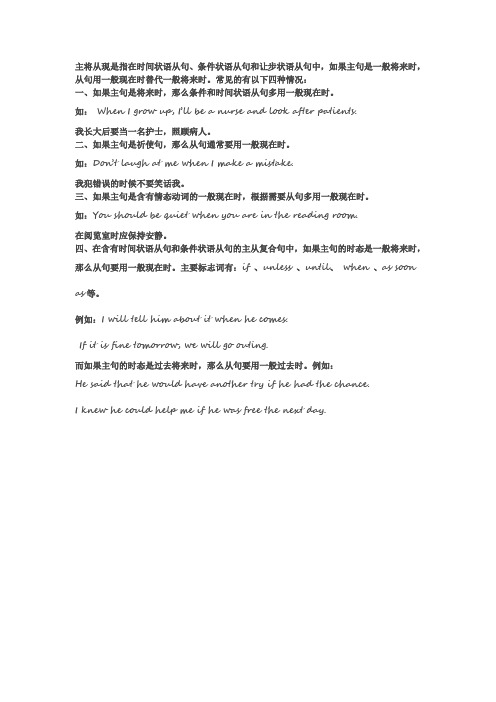
主将从现是指在时间状语从句、条件状语从句和让步状语从句中,如果主句是一般将来时,从句用一般现在时替代一般将来时。
常见的有以下四种情况:
一、如果主句是将来时,那么条件和时间状语从句多用一般现在时。
如:When I grow up, I’ll be a nurse and look after patients.
我长大后要当一名护士,照顾病人。
二、如果主句是祈使句,那么从句通常要用一般现在时。
如:Don’t laugh at me when I make a mistake.
我犯错误的时候不要笑话我。
三、如果主句是含有情态动词的一般现在时,根据需要从句多用一般现在时。
如:You should be quiet when you are in the reading room.
在阅览室时应保持安静。
四、在含有时间状语从句和条件状语从句的主从复合句中,如果主句的时态是一般将来时,那么从句要用一般现在时。
主要标志词有:if 、unless 、until、when 、as soon as 等。
例如:I will tell him about it when he comes.
If it is fine tomorrow, we will go outing.
而如果主句的时态是过去将来时,那么从句要用一般过去时。
例如:
He said that he would have another try if he had the chance.
I knew he could help me if he was free the next day.。
主将从现——精选推荐

主将从现主将从现主将从现是指在时间状语从句和条件状语从句中,如果主句是一般将来时,从句用一般现在时替代一般将来时。
现在时替代一般将来时。
常见的有以下四种情况:常见的有以下四种情况:一、一、 条件状语从句的主句是一般将来时,那么从句常常用一般现在时条件状语从句的主句是一般将来时,那么从句常常用一般现在时如When I grow up, I ’ll be a nurse and look a er pa ents 我长大后要当一名护士,照顾病人我长大后要当一名护士,照顾病人 二、二、 如果主句是祈使句,那么从句通常要用一般现在时如果主句是祈使句,那么从句通常要用一般现在时如:Don ’t laugh at me when I make a mistake. 我犯错误的时候不要笑话我。
我犯错误的时候不要笑话我。
三、三、 如果主句是含有情态动词的一般现在时,根据需要从句多用一般现在时如果主句是含有情态动词的一般现在时,根据需要从句多用一般现在时如:You should be quiet when you are in the reading room 在阅览室时应保持安静在阅览室时应保持安静 四. 如果if 的条件状语从句遇到变换间接和直接时的条件状语从句遇到变换间接和直接时 , 祈使句应用not to.... 如; She said not to close the window 常见的时间状语从句的连词有:as soon as, when, while ,as ,un l 等主将从现说的是在含有时间状语从句和条件状语从句的主从复合句中,如果主句的时态是一般将来时,那么从句要用一般现在时。
一般将来时,那么从句要用一般现在时。
例如:例如: I will tell him about it when he comes. If it is fine tomorrow, we will go ou ng. 任务I. 请用正确的形式填空。
如何理解时态呼应中的“主将从现”

如何理解时态呼应中的“主将从现”有朋友在本站“答疑中心”询问:如何理解时态呼应中的“主将从现”。
其实,英语语法书上没有“主将从现”这一语法术语,只是我们的英语教师在教学上为方便学生(主要是初学者)的理解和记忆,特地创造了这个术语。
它的意思是:当主句是一般将来时时,其相应的时间状语从句、条件状语从句、让步状语从句等习惯上要用一般现在时替代将来意义,而不能直接使用一般将来时。
一、通常情况1. “主将从现”见于时间状语从句As soon as I get through with my work I’ll join you. 我工作一做完就来找你们。
As soon as my divorce goes through, we’ll get married. 一俟我的离婚申请获准,我们就结婚。
Before they drive any of the buses, they will have to pass a special test. 然而在驾驶公共汽车前,他们必须通过专门测验。
My mother will be very angry with me when she finds out where I’ve been. 我母亲要是知道我到过那地方一定会大怒。
We’ll pay you half up front and the other half when you’ve finished the job. 我们先付给你一半钱,剩下的一半等你干完了再付。
2. “主将从现”见于条件状语从句If (it is) necessary I will come at 6. 如有必要,我6点钟来。
If today is Wednesday, the day after tomorrow will be Friday. 今天要是星期三,后天就是星期五。
If you train hard, you’ll make a good footballer. 你要刻苦训练就能成为优秀的足球运动员。
主将从现常见的有以下六种情况
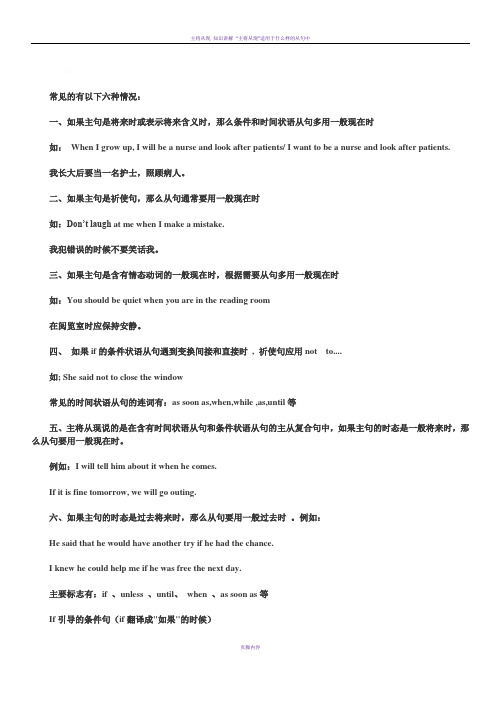
常见的有以下六种情况:一、如果主句是将来时或表示将来含义时,那么条件和时间状语从句多用一般现在时如:When I grow up, I will be a nurse and look after patients/ I want to be a nurse and look after patients.我长大后要当一名护士,照顾病人。
二、如果主句是祈使句,那么从句通常要用一般现在时如:Don’t laugh at me when I make a mistake.我犯错误的时候不要笑话我。
三、如果主句是含有情态动词的一般现在时,根据需要从句多用一般现在时如:You should be quiet when you are in the reading room在阅览室时应保持安静。
四、如果if的条件状语从句遇到变换间接和直接时, 祈使句应用not to....如; She said not to close the window常见的时间状语从句的连词有:as soon as,when,while ,as,until等五、主将从现说的是在含有时间状语从句和条件状语从句的主从复合句中,如果主句的时态是一般将来时,那么从句要用一般现在时。
例如:I will tell him about it when he comes.If it is fine tomorrow, we will go outing.六、如果主句的时态是过去将来时,那么从句要用一般过去时。
例如:He said that he would have another try if he had the chance.I knew he could help me if he was free the next day.主要标志有:if 、unless 、until、when 、as soon as等If引导的条件句(if翻译成"如果"的时候)Ⅰ.(if 从句) 主句v./ v.三单will+v.Ⅱ. if+sb+v./ v.三单can+v.某事很可能发生,条件是可能存在的,主句中某种情况发生的概率也是很高的。
主将从现常见的有以下六种情况
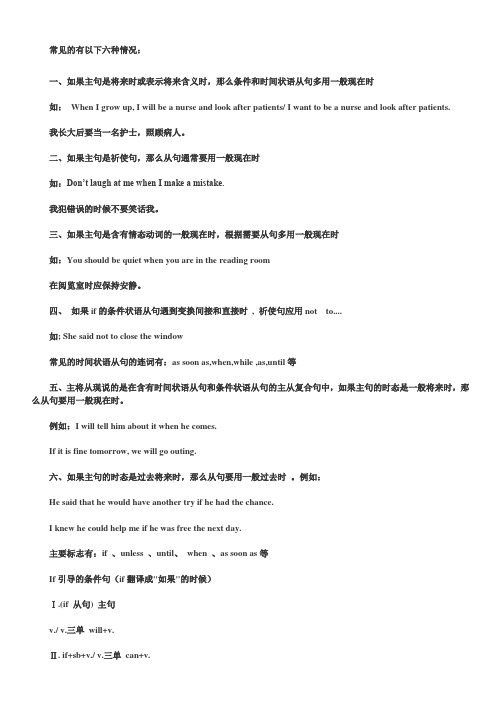
常见的有以下六种情况:一、如果主句是将来时或表示将来含义时,那么条件和时间状语从句多用一般现在时如:When I grow up, I will be a nurse and look after patients/ I want to be a nurse and look after patients.我长大后要当一名护士,照顾病人。
二、如果主句是祈使句,那么从句通常要用一般现在时如:Don’t laugh at me when I make a mistake.我犯错误的时候不要笑话我。
三、如果主句是含有情态动词的一般现在时,根据需要从句多用一般现在时如:You should be quiet when you are in the reading room在阅览室时应保持安静。
四、如果if的条件状语从句遇到变换间接和直接时, 祈使句应用not to....如; She said not to close the window常见的时间状语从句的连词有:as soon as,when,while ,as,until等五、主将从现说的是在含有时间状语从句和条件状语从句的主从复合句中,如果主句的时态是一般将来时,那么从句要用一般现在时。
例如:I will tell him about it when he comes.If it is fine tomorrow, we will go outing.六、如果主句的时态是过去将来时,那么从句要用一般过去时。
例如:He said that he would have another try if he had the chance.I knew he could help me if he was free the next day.主要标志有:if 、unless 、until、when 、as soon as等If引导的条件句(if翻译成"如果"的时候)Ⅰ.(if 从句) 主句v./ v.三单will+v.Ⅱ. if+sb+v./ v.三单can+v.某事很可能发生,条件是可能存在的,主句中某种情况发生的概率也是很高的。
八年级英语语法主将从现知识点精讲及专项练习
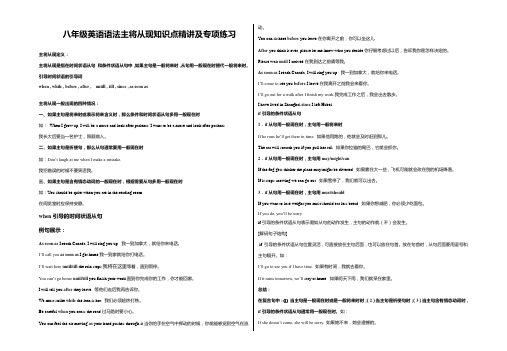
八年级英语语法主将从现知识点精讲及专项练习主将从现定义:主将从现是指在时间状语从句和条件状语从句中,如果主句是一般将来时,从句用一般现在时替代一般将来时。
引导时间状语的引导词when , while , before , after , untill , till , since , as soon as主将从现一般出现的四种情况:一、如果主句是将来时或表示将来含义时,那么条件和时间状语从句多用一般现在时如:When I grow up, I will be a nurse and look after patients/ I want to be a nurse and look after patients.我长大后要当一名护士,照顾病人。
二、如果主句是祈使句,那么从句通常要用一般现在时如:Don’t laugh at me when I make a mistake.我犯错误的时候不要笑话我。
三、如果主句是含有情态动词的一般现在时,根据需要从句多用一般现在时如:You should be quiet when you are in the reading room在阅览室时应保持安静。
when引导的时间状语从句例句展示:As soon as I reach Canada, I will ring you up. 我一到加拿大,就给你来电话。
I’ll call you as soon as I get home.我一到家就给你打电话。
I’ll wait here until/till the rain stops.我将在这里等着,直到雨停。
You can’t go home until/till you finish your work.直到你完成你的工作,你才能回家。
I will tell you after they leave. 等他们走后我再告诉你。
We must strike while the iron is hot. 我们必须趁热打铁。
主将从现整理笔记
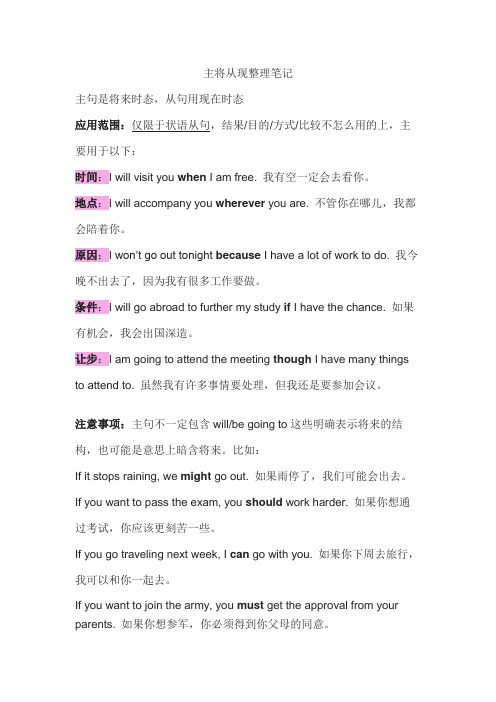
主将从现整理笔记主句是将来时态,从句用现在时态应用范围:仅限于状语从句,结果/目的/方式/比较不怎么用的上,主要用于以下:时间:I will visit you when I am free. 我有空一定会去看你。
地点:I will accompany you wherever you are. 不管你在哪儿,我都会陪着你。
原因:I won’t go out tonight because I have a lot of work to do. 我今晚不出去了,因为我有很多工作要做。
条件:I will go abroad to further my study if I have the chance. 如果有机会,我会出国深造。
让步:I am going to attend the meeting though I have many things to attend to. 虽然我有许多事情要处理,但我还是要参加会议。
注意事项:主句不一定包含will/be going to这些明确表示将来的结构,也可能是意思上暗含将来。
比如:If it stops raining, we might go out. 如果雨停了,我们可能会出去。
If you want to pass the exam, you should work harder. 如果你想通过考试,你应该更刻苦一些。
If you go traveling next week, I can go with you. 如果你下周去旅行,我可以和你一起去。
If you want to join the army, you must get the approval from your parents. 如果你想参军,你必须得到你父母的同意。
初中英语时态知识点:常见的主将从现的四种情况

Ifitisfinetomorrow,wewillgoouting.
如果主句的时态是过去将来时,那幺从句要用一般过去时。例如:
Hesaidthathewouldhaveanothertryifhehadthechance.
Iknewhecouldhelpmeifhewasfreethenextday.
在阅览室时应保持安静。
四、如果if的条件状语从句遇到变换间接和直接时,祈使句应用
notto....
如;Shesaidnottoclosethewindow
常见的时间状语从句的连词有:assoonas,when,while,as,until等
主将从现说的是在含有时间状语从句和条件状语从句的主从复合句
中,如果主句的时态是一般将来时,那幺从句要用一般现在时。例如:
主要标志有:if、unless、until、when、assoonas
我长大后要当一名护士,照顾病人。
二、如果主句是祈使句,那幺从句通常要用一般现在时
如:DontlaughatmewhenImakeamistake.
我犯错误的时候不要笑话我。
三、如果主句是含有情态动词的一般现在时,根据需要从句多用一般
现在时
如:Youshouldbequietwhenyouareinthereadingroom
初中英语时态知识点:常见的主将从现的四种情况
主将从现
主将从现是指在时间状语从句和条件状语从句和让步状语从句中,如
果主句是一般将来时,从句用一般现在时替代一般将来时。主将从现
常见的有以下四种情况:
一、时间状语从句的主句是一般将来时,那幺从句常常用一般现在
主将从现

♦ 主将从现指的是在含有时间状语从句和条件 状语从句的主从复合句中,如果主句的时态 是一般将来时,那么从句要用一般现在时。
♦主要标志: 时间状语从句:when, while, after, before, as soon as, until, since 条件状语从句:if , unless, as long as
主祈从现
主句是祈使句,从句用一般现 在时。
Please let me know if he comes back. Don’t laugh at me when I make a mistake.
主情从现
主句中含有情态动词,从句用 一般现在时。
You should be quiet when you are in the reading room. If you feel hungry ,you should eat something.
3. The students will plant trees if it _D__ tomorrow. A. didn’t rain B. hasn’t rained C. won’t rain
D. doesn’t rain
4. –When will you tell him the good news? --I will tell him about it as soon as he _A_ back. A. comes B. came C. will come D. is coming
5. --- Can I go to Beijing for my holiday, Dad? --- You can when you ___B____ a bit older. A. will get B. get C. are getting D. got
宾从,现完,主将从现
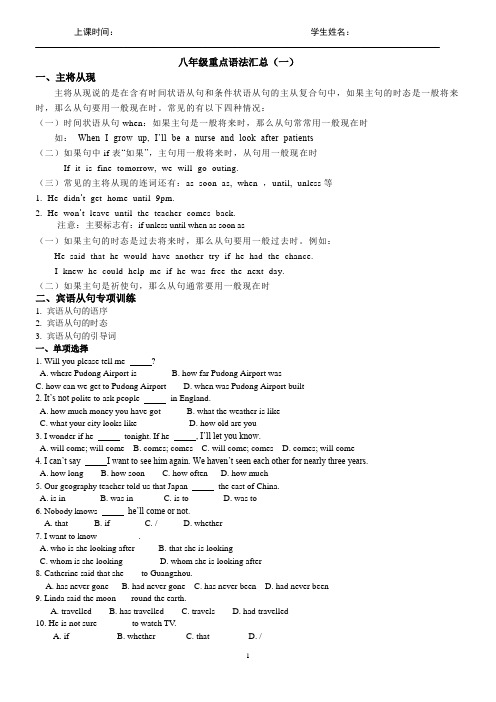
上课时间:学生姓名:——————————————————————————————————————————————八年级重点语法汇总(一)一、主将从现主将从现说的是在含有时间状语从句和条件状语从句的主从复合句中,如果主句的时态是一般将来时,那么从句要用一般现在时。
常见的有以下四种情况:(一)时间状语从句when:如果主句是一般将来时,那么从句常常用一般现在时如:When I grow up, I’ll be a nurse and look after patients(二)如果句中if表“如果”,主句用一般将来时,从句用一般现在时If it is fine tomorrow, we will go outing.(三)常见的主将从现的连词还有:as soon as, when ,until, unless等1. He didn’t get home until 9pm.2. He won’t leave until the teacher comes back.注意:主要标志有:if unless until when as soon as(一)如果主句的时态是过去将来时,那么从句要用一般过去时。
例如:He said that he would have another try if he had the chance.I knew he could help me if he was free the next day.(二)如果主句是祈使句,那么从句通常要用一般现在时二、宾语从句专项训练1. 宾语从句的语序2. 宾语从句的时态3. 宾语从句的引导词一、单项选择1. Will you please tell me ?A. where Pudong Airport isB. how far Pudong Airport wasC. how can we get to Pudong AirportD. when was Pudong Airport built2. It’s not polite to ask people in England.A. how much money you have gotB. what the weather is likeC. what your city looks likeD. how old are you3. I wonder if he tonight. If he , I’ll let you know.A. will come; will comeB. comes; comesC. will come; comesD. comes; will come4. I can’t say I want to see him again. We haven’t seen each other for nearly three years.A. how longB. how soonC. how oftenD. how much5. Our geography teacher told us that Japan the east of China.A. is inB. was inC. is toD. was to6. Nobody knows he’ll come or not.A. thatB. ifC. /D. whether7. I want to know _________.A. who is she looking afterB. that she is lookingC. whom is she lookingD. whom she is looking after8. Catherine said that she ___ to Guangzhou.A. has never goneB. had never goneC. has never beenD. had never been9. Linda said the moon___ round the earth.A. travelledB. has travelledC. travelsD. had travelled10. He is not sure _______ to watch TV.A. ifB. whetherC. thatD. /11. Mike is thinking about _______ his parents will see him today.A. ifB. whetherC. thatD. /12. --Do you know ______ the teacher will come back tomorrow or not?-- Sorry, I don’t know. _______ he comes back, I will tell you at once.A. if, WhetherB. if, IfC. whether, WhetherD. whether, If13. When they got to the cinema, the film _______ for the ten minutes.A.had been on B.has begun C.began D.had begun14. The teacher says _______ she will leave a message on the headmaster's desk.A.if B.who C.that D.what15. -Do you think ________ a concert in our school hall this weekend? -Yes, there will.A. there will haveB. there will beC. will there beD. will there have三、现在完成时专练(一).现在完成时的构成:现在完成时由助动词have(has)+动词的过去分词构成。
主将从现例句
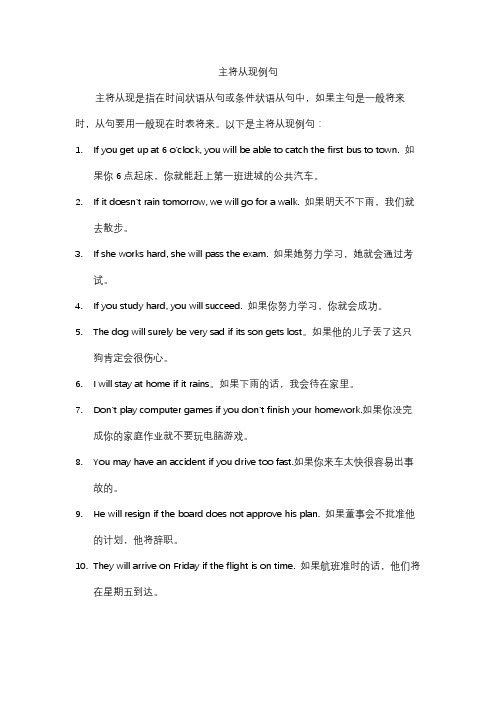
主将从现例句主将从现是指在时间状语从句或条件状语从句中,如果主句是一般将来时,从句要用一般现在时表将来。
以下是主将从现例句:1.If you get up at 6 o'clock, you will be able to catch the first bus to town. 如果你6点起床,你就能赶上第一班进城的公共汽车。
2.If it doesn't rain tomorrow, we will go for a walk. 如果明天不下雨,我们就去散步。
3.If she works hard, she will pass the exam. 如果她努力学习,她就会通过考试。
4.If you study hard, you will succeed. 如果你努力学习,你就会成功。
5.The dog will surely be very sad if its son gets lost。
如果他的儿子丢了这只狗肯定会很伤心。
6.I will stay at home if it rains。
如果下雨的话,我会待在家里。
7.Don't play computer games if you don't finish your homework.如果你没完成你的家庭作业就不要玩电脑游戏。
8.You may have an accident if you drive too fast.如果你来车太快很容易出事故的。
9.He will resign if the board does not approve his plan. 如果董事会不批准他的计划,他将辞职。
10.They will arrive on Friday if the flight is on time. 如果航班准时的话,他们将在星期五到达。
主将从现甄选
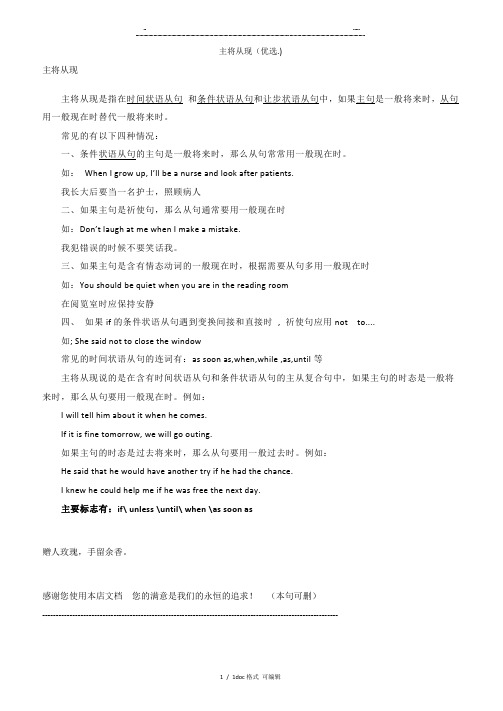
.. .........................................................................................................................................................................................主将从现(优选.)主将从现主将从现是指在时间状语从句和条件状语从句和让步状语从句中,如果主句是一般将来时,从句用一般现在时替代一般将来时。
常见的有以下四种情况:一、条件状语从句的主句是一般将来时,那么从句常常用一般现在时。
如:When I grow up, I’ll be a nurse and look after patients.我长大后要当一名护士,照顾病人二、如果主句是祈使句,那么从句通常要用一般现在时如:Don’t laugh at me when I make a mistake.我犯错误的时候不要笑话我。
三、如果主句是含有情态动词的一般现在时,根据需要从句多用一般现在时如:You should be quiet when you are in the reading room在阅览室时应保持安静四、如果if的条件状语从句遇到变换间接和直接时, 祈使句应用not to....如; She said not to close the window常见的时间状语从句的连词有:as soon as,when,while ,as,until等主将从现说的是在含有时间状语从句和条件状语从句的主从复合句中,如果主句的时态是一般将来时,那么从句要用一般现在时。
例如:I will tell him about it when he comes.If it is fine tomorrow, we will go outing.如果主句的时态是过去将来时,那么从句要用一般过去时。
高中主将从现_知识讲解

所谓的“主将从现”的第一层次,即“主句用将来时(现在将来时和过去将来时),从句用一般时(一般现在时和一般过去时)”,这一层次也可以称作“初中层次”。
第二层次:“主将”中将来时有将来进行时,将来完成时,将来完成进行时,而“从现”中相应的时态也可能是现在进行时,现在完成时,现在完成进行时。
例如:If the snow has completely stopped, we will be playing with snow on the playground.如果雪能够完全停下来,我们将正在操场上玩雪呢!If it is snowing, we will have been walking in the snow for more than two hours.如果天一直在下雪,我们将在雪地里走了两个多小时了。
另外,引导条件状语从句的连接词(connector)还可以是unless, so long as, in case, on condition that, supposing that, provided that 等。
if引导条件状语从句的两种用法:第一种用法:当某事发生的可能性较大时,这种情况,有个十三字口诀:“主将从现,主过将从过,主现从现”。
即主句是一般将来时,从句用一般现在时;主句用过去将来时,从句用一般过去时;当主句中有can/can’t 的话,则从句用一般现在时。
例如:If he has time, he will come tomorrow.If she finishes early, she can come back early.If you don’t do homework, the teacher will scold you.第二种用法:1.if从句还表示不可实现的条件或根本不可能存在的条件,也就是一种虚拟的条件或假设,从句多用一般过去时或过去完成时。
如:If I were you, I would invite him to the party.如果我是你,我会邀请他参加聚会。
英语主将从现的用法

英语主将从现的用法主将从现是英语中一个非常常见的语法现象,它是指在时间状语从句和条件状语从句中,用现在时态代替将来时态的用法。
也就是说,I.如果从句的表意是一般将来时,就要用一般现在时代替;II.如果从句表意是将来进行时,就要用现在进行时代替;III.如果从句表意是将来完成时,就要用现在完成时代替。
本文通过主将从现在时间状语从句和条件状语从句中的用法,分别详解主将从现的实际运用。
一、条件状语从句中的主将从现(常见引导词有if、unless、as long as)例句1:You will regret it if you don't follow my words. 如果你不按我说的做,你会后悔的。
注释:主句中用的是一般将来时,从句本来也应该是用一般将来时。
但是,在条件状语从句中用一般现在时(if you don't follow)代替一般将来时(if you will not follow)。
例句2:I will call you, but you don't have to answer my phone unless you are not having a class. 我会给你打电话,但是除非你到时候不在上课,否则你就不用接电话。
注释:从整个句子的时间来看,从句本应该是将来进行时。
由于是在条件状语从句中,所以用现在进行时(unless you are not having)代替将来进行时(unless you will not be having)。
例句3:As long as we have completed the task by the end of next month, we will certainly be praised. 只要我们再下个月底前完成这个任务,我们肯定会被表扬。
注释:从条件状语从句的时间状语"by the end of next month"可以看出这里本来应该用将来完成时。
E04 主将从现
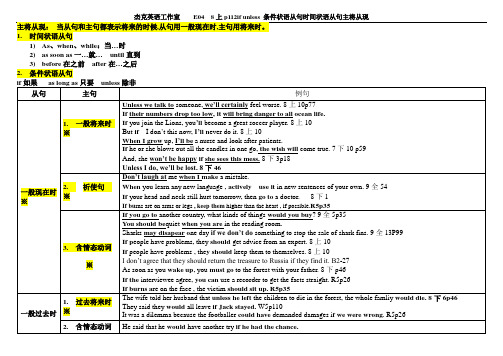
Ifpeople have problems , they shouldkeep them to themselves. 8上10
I don’t agree that they should return the treasure to Russia if they find it. B2-27
1.一般将来时※
Unlesswe talk tosomeone,we’ll certainlyfeel worse. 8上10p77
Iftheir numbers drop too low, itwill bring danger to allocean life.
Ifyou join the Lions, you’llbecome a great soccer player. 8上10
※
If you go toanother country, what kinds of thingswould you buy? 9全5p35
You should bequietwhen you arein the reading room.
Sharksmay disapearone dayif we don’t dቤተ መጻሕፍቲ ባይዱsomething to stop the sale of shark fins. 9全13P99
Assoon as youwake up, youmust goto the forest with your father. 8下p46
If theinterviewee agree,you canuse a recorder to get the facts straight. R5p26
主将从现的三种句型结构
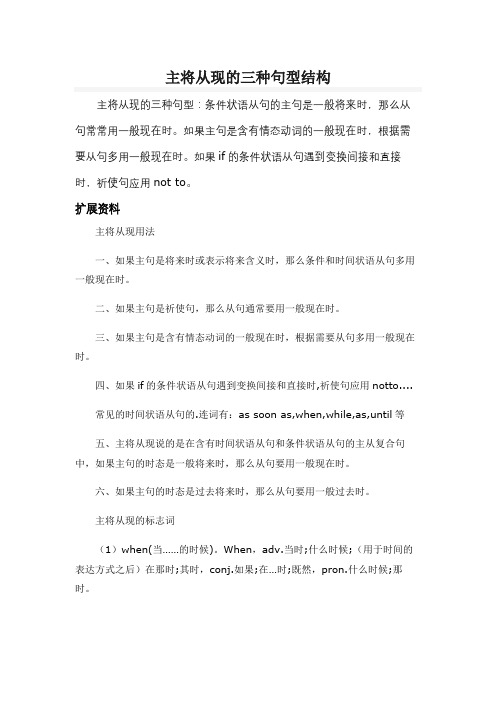
主将从现的三种句型结构主将从现的三种句型:条件状语从句的主句是一般将来时,那么从句常常用一般现在时。
如果主句是含有情态动词的一般现在时,根据需要从句多用一般现在时。
如果if的条件状语从句遇到变换间接和直接时,祈使句应用not to。
扩展资料主将从现用法一、如果主句是将来时或表示将来含义时,那么条件和时间状语从句多用一般现在时。
二、如果主句是祈使句,那么从句通常要用一般现在时。
三、如果主句是含有情态动词的一般现在时,根据需要从句多用一般现在时。
四、如果if的条件状语从句遇到变换间接和直接时,祈使句应用notto....常见的时间状语从句的.连词有:as soon as,when,while,as,until等五、主将从现说的是在含有时间状语从句和条件状语从句的主从复合句中,如果主句的时态是一般将来时,那么从句要用一般现在时。
六、如果主句的时态是过去将来时,那么从句要用一般过去时。
主将从现的标志词(1)when(当……的时候)。
When,adv.当时;什么时候;(用于时间的表达方式之后)在那时;其时,conj.如果;在…时;既然,pron.什么时候;那时。
(2)whenever(每当)。
Whenever,adv.究竟什么时候;不论何时,conj.每当;无论何时;随时;无论什么时候(3)after(在……之后)。
After,prep.…后的;(表示时间)在…以后;(表示位置、顺序)在…后面,conj.在…以后,adv.以后,继后。
(4)before(在……之前)。
Before,prep.在…之前;先于,优于;当着…的面;与其…,conj.在…之前;在…以前;比…早些;与其…。
(5)as(当……;一边……一边)。
As,adv.同样地,一样地;例如,prep.作为,以…的身份;如同,conj.由于;像,像…一样;同时,当…时;尽管。
- 1、下载文档前请自行甄别文档内容的完整性,平台不提供额外的编辑、内容补充、找答案等附加服务。
- 2、"仅部分预览"的文档,不可在线预览部分如存在完整性等问题,可反馈申请退款(可完整预览的文档不适用该条件!)。
- 3、如文档侵犯您的权益,请联系客服反馈,我们会尽快为您处理(人工客服工作时间:9:00-18:30)。
主将从现知识讲解“主将从现”适用于什么样的从句中
所谓的“主将从现”
第一层次,即“主句用将来时(现在将来时和过去将来时),从句用一般时(一般现在时和一般过去时)”,这一层次也可以称作“初中层次”。
第二层次:“主将”中将来时有将来进行时,将来完成时,将来完成进行时,而“从现”中相应的时态也可能是现在进行时,现在完成时,现在完成进行时。
例如:
If the snow has completely stopped, we will be playing with snow on the playground.
如果雪能够完全停下来,我们将正在操场上玩雪呢!
If it is snowing, we will have been walking in the snow for more than two hours.
如果天一直在下雪,我们将在雪地里走了两个多小时了。
另外,引导条件状语从句的连接词(connector)还可以是unless, so long as, in case, on condition that, supposing that, provided that 等。
if引导条件状语从句的两种用法:
第一种用法:
当某事发生的可能性较大时,这种情况,有个十三字口诀:“主将从现,主过将从过,主现从现”。
即主句是一般将来时,从句用一般现在时;主句用过去将来时,从句用一般过去时;当主句中有can/can’t的话,则从句用一般现在时。
例如:If he has time, he will come tomorrow.
If she finishes early, she can come back early.
If you don’t do homework, the teacher will scold you.
第二种用法:
1.if从句还表示不可实现的条件或根本不可能存在的条件,也就是一种虚拟的条件或假设,从句多用一般过去时或过去完成时。
如:
If I were you, I would invite him to the party.
如果我是你,我会邀请他参加聚会。
I would have arrived much earlier if I had not been caught in the traffic.如果没有堵车,我会到的早一点儿。
2.but for, without等引出一个介词结构来表示条件,条件常常是虚拟的,或与事实相反的假设。
如:
but for若非,要不是
But for the rain, we should have a pleasant journey.
要不是下雨,我们的旅行肯定会很愉快。
在 if 引导的条件状语从句中,如果从句谈论的是一个有可能发生的事实及其产生的相关的结果,主句用一般将来时态,从句用一般现在时态。
如:
We can walk there if we can't find a bus .
If it rains tomorrow , we will not go to the zoo.
What will you do if you find a panda in danger.
如果 if 条件句谈论的是重复发生和预示要发生的情景和事件,则主从句大多用一般现在时态。
如:
If bears are in danger ,they attack people.
注意:
在 if 引导的条件状语从句中,if 条件句位置灵活,可直接放在主句后面,若 if 条件句放句首,
从句后面要加逗号,和主句隔开。
还要注意前后时态一致原则
我们知道,引导条件状语从句最常用的连词是if,由if引导的条件状语从句表示在某种条件下某事很可能发生。
如:
If you ask him, he will help you.如果你请他帮忙,他会帮你的。
If you fail in the exam, you will let him down.如果你考试不及格,你会让他失望的。
另外,if从句还表示不可实现的条件或根本不可能存在的条件,也就是一种虚拟的条件或假设,从句多用一般过去时或过去完成时。
如:
If I were you, I would invite him to the party.如果我是你,我会邀请他参加聚会。
I would have arrived much earlier if I had not been caught in the traffic.如果没有堵车,我会到的早一点儿。
那么,除了if之外,是否还有其他连词也可以引导条件状语从句呢?回答是肯定的,不仅有,还有很多。
这些词由于出现的频率较小,且用法较复杂一些,所以不如if为大家所熟知罢了。
下面就这些词的用法以例句的形式进行一下简单总结。
1. unless conj.除非,若不,除非在……的时候
You will fail to arrive there in time unless you start earlier.如果你不早点动身,你就不能及时赶到那儿。
Unless it rains, the game will be played.除非下雨,比赛将照常进行。
3. supposing conj.如果,假如
supposing引导的条件从句表示一种假设条件。
Supposing it rains, shall we continue the sports meeting?倘若下雨,我们的运动会还要继续举行吗?
Supposing something should go wrong, what would you do then?假如出了什么问题,你准备怎么对付?
从上述例句可以看出if, unless, on condition (that), supposing, provided等词引导的条件状语从句,主从句条件关系分明,结构清晰。
但有些句子,虽没有含条件关系的连词,却也隐含着条件关系,这些句子常用一些词,如but for, without等引出一个介词结构来表示条件,条件常常是虚拟的,或与事实相反的假设。
如:
but for若非,要不是
But for the rain, we should have a pleasant journey.要不是下雨,我们的旅行肯定会很愉快。
But for your help, we should not have finished in time.要不是你帮忙,我们肯定不能及时完成
“ I’ll not go to the zoo if it rains tomorrow.
( 假如明天下雨,我就不去动物园。
)
You can come to the party if you don’t wear jeans.
(如果你不穿牛仔裤,你就能来舞会。
)”
If I were you, I would wear jeans and T-shirt.
(如果我是你,我就穿牛仔裤和T恤。
)”
当某事发生的可能性较大时,这种情况,有个十三字口诀:“主将从现,主过将从过,主现从现”。
即主句是一般将来时,从句用一般现在时;主句用过去将来时,从句用一般过去时;当主句中有can/can’t的话,则从句用一般现在时。
例如:
If he has time, he will come tomorrow.
If she finishes early, she can come back early.
If you don’t do homework, the teacher will scold you.
主将从现是指在时间状语从句和条件状语从句中,如果主句是一般将来时,从句用一般现在时替代一般将来时。
常见的有以下四种情况:
一、条件状语从句的主句是一般将来时,那么从句常常用一般现在时
如:When I grow up, I’ll be a nurse and look after patients 我长大后要当一名护士,照顾病人
二、如果主句是祈使句,那么从句通常要用一般现在时如:Don’t laugh at me when I make a mistake.
我犯错误的时候不要笑话我。
三、如果主句是含有情态动词的一般现在时,根据需要从句多用一般现在时如:You should be quiet when you are in the reading room 在阅览室时应保持安静四. 如果if的条件状语从句遇到变换间接和直接时, 祈使句应用not to.... 如; She said not to close the window 常见的时间状语从句的连词有:as soon as,when,while ,as,until等主将从现说的是在含有时间状语从句和条件状语从句的主从复合句中,如果主句的时态是一般将来时,那么从句要用一般现在时。
例如:I will tell him about it when he comes. If it is fine tomorrow, we will go outing. 如果主句的时态是过去将来时,那么从句要用一般过去时。
例如:He said that he would have another try if he had the chance. I knew he could help me if he was free the next day.。
